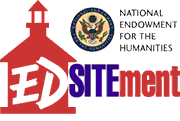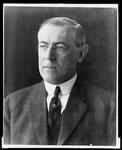|

|
The Debate in the United States over the League of Nations
—Curriculum Unit Overview—
“Sometimes people call me an idealist. Well, that is the way I know I am an American . . . America is the only idealist nation in the world.”
—President Woodrow Wilson
“National I must remain and in that way I, like all other Americans, can render the amplest service to the world.”
—Senator Henry Cabot Lodge
Introduction
American foreign policy continues to resonate with the issues surrounding the debate over U.S. entry into the League of Nations-collective security versus national sovereignty, idealism versus pragmatism, the responsibilities of powerful nations, the use of force to accomplish idealistic goals, the idea of America. Understanding the debate over the League and the consequences of its ultimate failure provides insight into international affairs in the years since the end of the Great War and beyond.
In this lesson, students read the words and listen to the voices of some central participants in the debate over the League of Nations.
Note: This lesson may be taught either as a stand-alone lesson or as
a sequel to the complementary EDSITEment lesson U.S.
Entry into World War I: A Documentary Chronology.
Guiding Questions:
What was Woodrow Wilson's role in and vision for peace and the League of Nations after World War I?
What were the central issues in the debate in America over the League of Nations?
Learning Objectives
After completing the lessons in this unit, students will be able to:
- Describe Wilson's concepts for peace and the League of Nations and efforts to foster American support for it.
- Discuss the opposition to the League in the Senate.
Preparing to Teach this Curriculum Unit
- Review the curriculum unit. Locate and bookmark suggested materials and other useful websites. Download and print out documents you will use and duplicate copies as necessary for student viewing.
Download the blackline masters for this lesson, available here as a PDF file. Print out and make an appropriate number of copies of any handouts you plan to use in class.
- Before printing any oversized documents, use the Print Preview function of your browser to see how each will look. Change the settings in Page Setup, as desired, by selecting Print Preview from the FILE option in your browser. Use the Print Preview function after making changes.
- This unit is intended for students familiar with the basic facts about World War I and its aftermath.
- For background on the League of Nations, read Chapter Nine: The League of Nations (from “An Outline of American History,” USIA, 1994) on From Revolution to Reconstruction, a link from the EDSITEment resource American Studies at the University of Virginia.
- To help students understand the personalities involved in the debate over the League of Nations, give them the opportunity to view the following videos available on the PBS website Woodrow Wilson, on the page Wilson—A Portrait: The League of Nations a link from the EDSITEment resource American Memory:
Unit Lessons
Extending the Lesson
- The EDSITEment resource Digital Classroom offers a lesson on Churchill and FDR, a portion of which discusses the Atlantic Charter and its relationship to the Fourteen Points. When the class studies World War II, this lesson would be a good follow-up to earlier lessons on the Fourteen Points and the League of Nations.
- The EDSITEment-reviewed website Links to the Past offers a lesson entitled Woodrow Wilson: Prophet of Peace (from the Teaching with Historic Places Lesson Plan), inspired by the Woodrow Wilson House in Washington, D.C. It features some excellent archival documents and activities, some of which are used in this lesson, for teaching about Wilson and especially his fight for the League of Nations.
- Students interested in World War I poetry and prose can consult the following EDSITEment resources:
- In the mid-1930s, the Nye Committee investigated the relationship between
the munitions industry and foreign policy. Though its conclusions are still
disputed today, the committee's report had a profound influence on American
isolationism between the World Wars and on the peace movement. A principal
Nye Committee Report
on the growth and influence of the munitions industry after World War I is
accessible from Documents
of World War I, a link from the EDSITEment-reviewed website Great
War Primary Documents Archive.
- President Wilson established the Committee for Public Information to influence
public opinion, encourage enlistment, demonize the enemy, and increase the
sale of war bonds. Students interested in studying the propaganda produced
by the CPI can consult:
- A brief and very Basic History
of the United Nations and its relation to the League of Nations is available
on the home page of the United Nations, a
link from the EDSITEment resource Internet Public
Library. For a more detailed look at the United Nations, start from the
Index to UN Website.
Selected EDSITEment Websites
Standards Alignment
View your state’s standards
|





